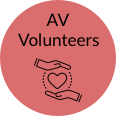Respect & Social Inclusion
The students at UC Berkeley are an excellent example of a volunteer resource, from student groups specifically created to improve the welfare of older adults to individuals who sign up to volunteer, for example at the Senior Centers, Meals on Wheels and Ashby Village. Seniors in Berkeley are diverse and may have many intersecting identities that make them more or less vulnerable to agism and other forms of discrimination. Volunteer and service programs keep these issues in mind when engaging with local residents.
Age Friendly Resources
Public
Nonprofit & University
Community Survey Results
As a "college town", there are many activities and organizations in Berkeley that are focused on attracting the younger generations. Older adults are also active in the community and identified a wide variety of social resources they consider important.
The vast majority of our survey respondents have someone to socialize with at least weekly and have friends or family to turn to when they need help. At least 6% of the respondents, however, socialize less than once a week and the survey did not capture some of the more isolated seniors.
94%
of survey respondents socialize at least once a week
68%
of survey respondents would turn to family, a friend, or a neighbor if they needed information about services
Take Aways
Equity and Inclusion: Seniors in Berkeley are a diverse group, some with many intersecting identities. Language, race, immigration status, sexual orientation, gender, income level, housing status, and other factors all play a role in the way seniors experience life in Berkeley and it is important for volunteers and service providers to keep this in mind.
Information: The people who filled out our survey are involved in activities in the community and most are socially connected. However, we know this is not representative of the larger community because our survey relied on community organizations and social networks for distribution. Some of the reasons people don't participate in the community is because they are isolated and/or don't know about the activities or resources that could help them participate. The City and organizations need to communicate information clearly and reach out to people who may be more isolated.


















